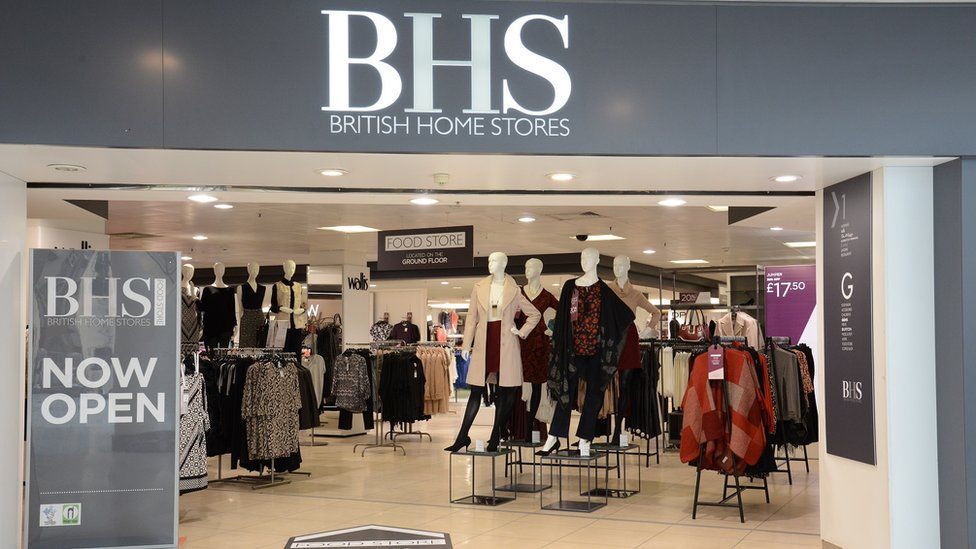BHS files for administration
- Published

BHS: A stalwart on Britain's High Streets for 88 years, it is expected to file for administration
Troubled department store British Home Stores (BHS) has filed for administration.
The retailer's debts top £1.3bn and include a pensions deficit of £571m. Some 11,000 jobs are now under threat.
BHS was bought by billionaire Sir Philip Green for £200m in 2000, but he sold it last year for just £1.
New owners Retail Acquisitions, a consortium of financiers, lawyers and accountants, have failed to raise £160m in fresh capital to reverse losses.
"This has awful echoes of the demise of Woolworths," said Nick Hood, business risk advisor at Opus, an insolvency practice. "It's a disaster."
High Street competitors like Primark have proved a major challenge for BHS
Cutting rents
BHS has lost money for each of the past seven years, and had asked creditors to agree to a Company Voluntary Arrangement (CVA).
In effect, this would have been a compromise financial deal that depended on the creditors accepting reduced rents.
BHS had previously said this effort would be vital to turn around the business. But news that the company is filing for administration shows those attempts have failed.
In 2000 billionaire Sir Philip Green bought BHS and made it part of the Arcadia Group, then the UK's second-largest retail empire, but was ultimately unable to stem its losses
Global presence
BHS has operated an international franchise business for more than 30 years. Its current partners operate stores in more than a dozen countries across Europe, the Middle East and Central Asia.
The retailer had recently divided its 164 UK stores into three groups - depending on their profitability.
The company's turnaround plan called for the rents at 77 stores to remain unchanged, while for another 47 stores the company was "seeking a reduction in rent to market levels."
The company had hoped the 40 least-profitable locations would continue to trade for a minimum period of 10 months, while the discussions over "substantially" reduced rents continued.
Pensions deficit
BHS had also been in talks to address its £571m pension deficits with the Pension Protection Fund (PPF), the government-supported rescue agency, as well as the Pensions Regulator and the BHS pension trustees.
BHS may have been around around a long time, but despite being well-known it has struggled to find a profitable niche for itself in recent years
BHS recently maintained it would continue to meet its payment obligations for roughly 20,000 pension holders, and any new buyer of the company would be required to take on this significant deficit.
But in the BHS CVA submission, company directors indicated they were hopeful the two pension schemes would be transferred into the PPF, leaving the firm without further funding liabilities.
As recently as late March, BHS warned it needed extra funding to continue trading and was trying to raise £100m.
They sold their Oxford Street lease in London for £30m but it was far less than they hoped for. And they also sold the lease on a Sunderland store to Sports Direct's Mike Ashley for £2m.
BHS: A history of a High Street stalwart
British Homes Stores first opened for business in Brixton, south London in 1928
1928: A group of American entrepreneurs set up British Home Stores. The first store is in Brixton and nothing in the store costs more than a shilling (5p) - double that of rival Woolworth's maximum price of sixpence
1929: BHS raises its maximum price to five shillings (25p) allowing it to sell home furnishings, including drapery
1970: The firm expands steadily in the postwar era - by the beginning of the year it employs some 12,000 workers in 94 stores across the UK
1985: BHS begins to franchise its brand to stores around the world, to which it supplies products and support
1986: The store merges with designer Sir Terence Conran's Habitat and Mothercare to form Storehouse Plc, and the "British Home Stores" name is replaced with "BhS", then "Bhs" and eventually "BHS"
2000: Retail billionaire Sir Philip Green buys BHS from Storehouse Plc for £200m
2002: BHS becomes part of the Arcadia empire, controlled by Sir Philip, when he buys the clothing group and its Topshop, Dorothy Perkins and Burton brands
2005: The store resurrects its "British Home Stores" branding, but it is losing ground to cheaper rivals like Primark
2015: Sir Philip sells the loss-making BHS for £1 to Retail Acquisitions led by Dominic Chappell, writing off £215m of debts in the process
2016: BHS begins an insolvency procedure to reduce its rents and transfer its pensions liabilities into the Pension Protection Fund, the government-supported rescue agency
- Published23 March 2016
- Published7 March 2016
- Published3 March 2016
- Published18 September 2015
- Published18 September 2015
- Published18 September 2015